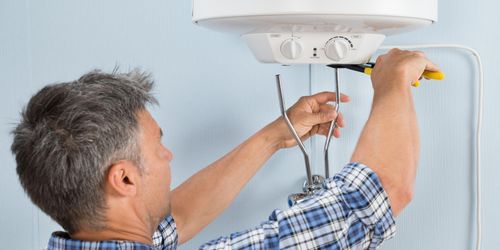Handling the Typical Water Heater Crisis Scenarios
Handling the Typical Water Heater Crisis Scenarios
Blog Article
They are making several good points related to The Importance of Water Heater Maintenance in general in this content followed below.

A water heater is one of one of the most essential standard devices that can be found in a residence. With hot water heater, you don't need to experience the anxiety of home heating water manually every single time there is a demand to take a bath, do the laundry, or the dishes. There is constantly a possibility that your water heating system would certainly act up as with the majority of mechanical devices.
It is important to note any kind of little malfunction and tackle it promptly prior to things leave hand. A lot of times, your hot water heater starts to malfunction when there is a build-up of sediments as a result of continual use. As a preventative measure, routine flushing of your hot water heater is recommended to avoid debris buildup as well as avoid functional failure.
Common water heater emergency situations and also how to deal with them
Insufficient hot water
Managing an inadequate supply of hot water can be frustrating. It might be that the hot water heater can not sustain the hot water need for your apartment or condo. To deal with this trouble, you could try to adjust your heating system's temperature dial as well as wait for a few mins. You can ask for the aid of a specialist plumber if the problem continues. You can update your water heater to one with a bigger ability.
Rising and fall water temperature.
Your water heater can begin creating water of various temperature levels usually ice hot or chilly hot. There may be a demand to change either the thermostat or the heating system of your water heater.
Dripping water heater container.
In this circumstance, you ought to transform off your water heating system, permit it to cool down, and also carefully look for the source of the problem. At times, all you require to do is to tighten up a few screws or pipe links in cases of small leakages. If this doesn't function and the leak continues, you might need to employ the solutions of a technician for a proper replacement.
Stained or smelly water
When this occurs, you need to recognize if the problem is from the storage tank or the water resource. If there is no amusing scent when you run cold water, then you are certain that it is your water heating system that is damaged. The stinky water can be triggered by rust or the buildup of germs or sediments in the water heater container.
Conclusion
Some house owners disregard little warning and minor faults in their hot water heater device. This just brings about further damages as well as a possible total break down of your home appliance. You must manage your water heater mistakes as quickly as they come up to stay clear of more costs and unneeded emergency problems.
With water heating units, you do not need to go through the stress of heating water by hand every time there is a requirement to take a bath, do the washing, or the dishes. It might be that the water heating unit can't sustain the hot water need for your house. Your water heating system might start creating water of different temperatures normally ice scalding or cold hot. If there is no funny smell when you run chilly water, then you are specific that it is your water heating system that is faulty. The stinky water can be caused by corrosion or the buildup of microorganisms or sediments in the water heating unit tank.
Common Water Heater Issues and What You Should Do
What Type of Water Heater Do You Have?
Before we begin it’s first important that you identify the type of water heater you have on your property. There are two main types of water heaters out there: conventional and high efficiency.
Both of these types of products typically use either gas or electricity to heat power. There are also solar water heaters that use a thermal collector on the roof or yard to heat the water.
While these models are not as common, they can cut heating costs in half. In this article, we will focus on conventional and high efficiency.
How Do My Electric and Gas Water Heater Work?
Though they look similar, electric and gas water heaters work very differently. It’s important to know their basic function because often problems can be specific to the heating source.
In the electric model, a thermostat on the side of the machine detects the temperature of the water in the tank. When the temperature needs to rise electricity flows to a heating element suspended in the water.
Gas models also use a thermostat device — typically with a mercury sensor at the tip and an additional sensor called a thermocouple. The thermocouple detects whether the pilot light is on and controls the flow of gas.
When the thermostat drops below the appropriate level gas is released which becomes ignited by the pilot light. The flame heats the bottom of the water tank which causes hot water to rise and cold water to drop.
This natural circulation continues until the water reaches the desired temperature. Then, the thermostat triggers the gas control valve to shut off the flow of gas.
What Are the Most Common Issues and How Do You Fix Them?
https://happyhiller.com/blog/common-water-heater-issues-and-what-you-should-do/

I hope you enjoyed our topic about Is Your Water Heater Leaking?. Thanks a ton for taking time to read our short article. Are you aware of someone else who is curious about the niche? Take a moment to promote it. Thank-you for your time spent reading it.
Schedule A Service Call Report this page